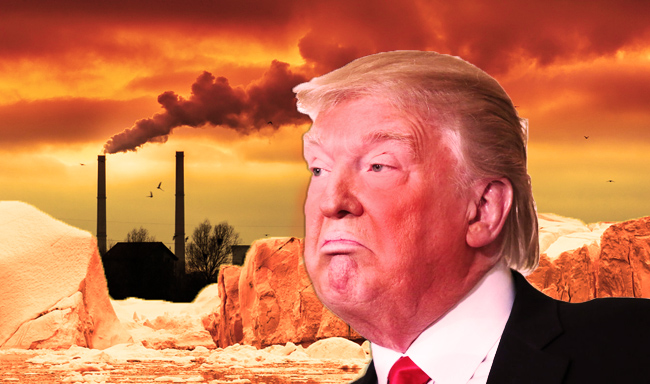
The latest federal climate change report does not paint a positive picture for the future of the planet. The New York Times received a draft of the report and it details a current trend that contradicts the stance of the White House and critics of climate change, concluding that humans are the main contributors to the growing climate problems facing the planet:
“Evidence for a changing climate abounds, from the top of the atmosphere to the depths of the oceans,” a draft of the report states. A copy of it was obtained by The New York Times.
The authors note that thousands of studies, conducted by tens of thousands of scientists, have documented climate changes on land and in the air. “Many lines of evidence demonstrate that human activities, especially emissions of greenhouse (heat-trapping) gases, are primarily responsible for recent observed climate change,” they wrote.
The reasoning for the New York Times receiving a draft of the unreleased report is due to scientists having concerns that the Trump administration and the EPA — who would both have to approve the report by August 18th along with 11 other agencies — would work to suppress, change, and stop its release. The report is part of the larger National Climate Assessment mandated by Congress every four years and already has the approval of the National Academy of Sciences.
Some of the more chilling details in the report show that most Americans are already experiencing the effects of climate change, pointing toward increases in rainfall for parts of the country while droughts are more prevalent in the southwestern portions of the nation. It also points out that air temperatures in Alaska and the Arctic are increasing “twice as fast as the global average” and that the “global mean temperature” rise since 1951 can be directly linked to human activities:
The report concludes that even if humans immediately stopped emitting greenhouse gases into the atmosphere, the world would still feel at least an additional 0.50 degrees Fahrenheit (0.30 degrees Celsius) of warming over this century compared with today. The projected actual rise, scientists say, will be as much as 2 degrees Celsius.
A small difference in global temperatures can make a big difference in the climate: The difference between a rise in global temperatures of 1.5 degrees Celsius and one of 2 degrees Celsius, for example, could mean longer heat waves, more intense rainstorms and the faster disintegration of coral reefs.
The increased temperatures in Alaska and the Arctic would have direct effects on many parts of the U.S. according to the New York Times, not to mention the threat of extreme weather around the globe that could bring about social and economic changes, possibly creating unrest like we’re currently seeing in places like Syria.
The report itself is less of a call to action than it is a reminder that this is a real problem and the least we could do is respond to like a real problem. The concerns of the scientists connected to the report would seem to warranted considering the administration’s current stance on the causes of climate change and the United States’ exit from the Paris Climate Accords. The reaction from the White House will be interesting to see, especially considering the current stance on leaks.
(Via New York Times)
